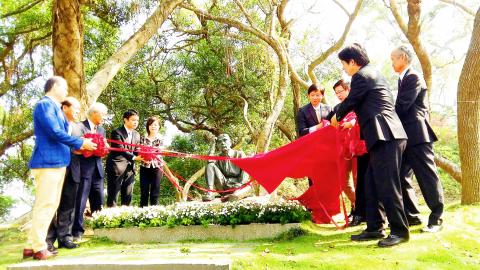Tainan Mayor William Lai (賴清德) yesterday attended the unveiling of a repaired statue of Japanese engineer Yoichi Hatta that was decapitated last month, saying Japan-Taiwan relations are now stronger.
Lai apologized to the Hatta family for the city’s failure to protect the statue and called the decapitation a test that revealed true feelings in both nations.
Members of Hatta’s family, who were also in attendance, thanked the city for its quick repair of the statue and said that Japan-Taiwan ties would not be affected.

Photo: Wang Han-ping, Taipei Times
The statue, located near Tainan’s Wushantou Reservoir (烏山頭水庫), honors Hatta, who is known as the “father of the Chianan Irrigation System” for his contributions to the development of irrigation during the Japanese colonial era.
The statue’s head was removed on April 15, allegedly by former Taipei city councilor Lee Cheng-lung (李承龍), who later told prosecutors he did not agree with the historical status afforded to Hatta.
The Chia-Nan Irrigation Association and the Chi Mei Museum cooperated to repair the statue, opting to use an identical replacement head when the original could not be found.
A commemorative ceremony for Hatta is to be held this afternoon, and is to be attended by his eldest grandson, Shuichi Hatta, and other family members, Japan-Taiwan Exchange Association Director-General Kinzo Nakagun, Kanazawa City Mayor Yukiyoshi Yamano and Kaga City Deputy Mayor Atsushi Kawai.
Association president Yang Ming-feng (楊明風) said the repaired statue would be well-protected and well-monitored with improved lighting and cameras.
“The water shortages we face these days really highlight the importance of Yoichi Hatta’s contributions to irrigation and the Wushantou Reservoir,” Yang said.
Meanwhile, city officials have expressed concern that statues of other historical Japanese figures might come under attack, such as that of Japanese colonial-era Tainan mayor Matao Hatori.
Hatori defied protests from fellow Japanese to reinstate Confucian rituals and repair Chihkan Tower (赤崁樓, formerly Fort Provintia), where a commemorative statue of him was later installed.
The city government requested police to step up patrols at all statue sites, saying that statues of some historical Taiwanese figures, such as Japanese colonial-era lawyer and 228 Incident hero Tang De-Jhang (湯德章) and Republic of China founder Sun Yat-sen (孫中山), might also become targets.
Police said they cannot enter historic sites at will, but have been in touch with Chihkan Tower security guards, advising them to be on the lookout for suspicious people.
One tour guide said statues of historical Japanese figures such as Hatta, Hatori and Goto Shinpei, who served as head of Taiwanese civilian affairs under Japanese rule, are popular among Japanese tourists.
Hatori is particularly notable for his protection of Taiwanese culture and artifacts such as Confucian rituals and the bell at Kaiyuan Temple in Tainan’s North District (北區), the guide said.
Additional reporting by Wang Chieh

“China is preparing to invade Taiwan,” Deputy Minister of Foreign Affairs Francois Wu (吳志中) said in an exclusive interview with British media channel Sky News for a special report titled, “Is Taiwan ready for a Chinese invasion?” the Ministry of Foreign Affairs said today in a statement. The 25-minute-long special report by Helen Ann-Smith released yesterday saw Sky News travel to Penghu, Taoyuan and Taipei to discuss the possibility of a Chinese invasion and how Taiwan is preparing for an attack. The film observed emergency response drills, interviewed baseball fans at the Taipei Dome on their views of US President

ECONOMIC BENEFITS: The imports from Belize would replace those from Honduras, whose shrimp exports have dropped 67 percent since cutting ties in 2023 Maintaining ties with Taiwan has economic benefits, Ministry of Foreign Affairs officials said yesterday, citing the approval of frozen whiteleg shrimp imports from Belize by the Food and Drug Administration (FDA) as an example. The FDA on Wednesday approved the tariff-free imports from Belize after the whiteleg shrimp passed the Systematic Inspection of Imported Food, which would continue to boost mutual trade, the ministry said. Taiwan’s annual consumption of whiteleg shrimps stands at 30,000 tonnes, far exceeding domestic production, the ministry said. Taiwan used to fill the gap by importing shrimps from Honduras, but purchases slumped after Tegucigalpa severed diplomatic ties with Taiwan

The Executive Yuan yesterday approved a southwestern extension of the Sanying MRT Line from New Taipei to Bade District (八德) in Taoyuan, with a goal of starting construction by late 2026. The 4.03-kilometer extension, featuring three new stations, will run from the current terminus at Yingtao Fude Station (LB12) in New Taipei City to Dannan Station (LB14), where it will connect with Taoyuan’s Green Line, New Taipei City Metro Corp said in a statement. This extension will follow the completion of core Sanying Line, a 14.29-kilometer medium-capacity system linking Tucheng (土城), Sansia (三峽)

CARGO LOSS: About 50 containers at the stern of the ‘Ever Lunar’ cargo ship went overboard, prompting the temporary closure of the port and disrupting operations Evergreen Marine Corp, Taiwan’s largest container shipper, yesterday said that all crew members aboard the Ever Lunar (長月) were safe after dozens of containers fell overboard off the coast of Peru the previous day. The incident occurred at 9:40am on Friday as the Ever Lunar was anchored and waiting to enter the Port of Callao when it suddenly experienced severe rolling, Evergreen said in a statement. The rolling, which caused the containers to fall, might have been caused by factors including a tsunami triggered by an earthquake in Russia, poor winter sea conditions in South America or a sudden influx of waves,